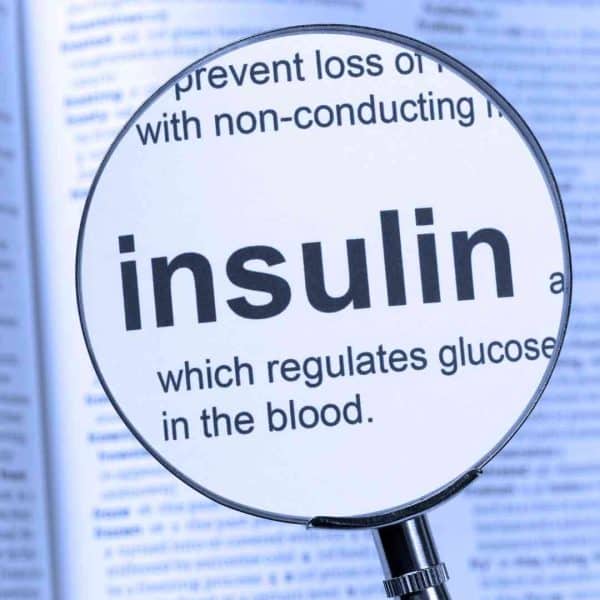
Insulin resistance leads to several serious health problems, including bone loss. This condition impacts how your body processes sugar and is common among older adults. However, it's not inevitable and can be combated through changes to your diet.
In this article, you'll learn about insulin resistance, what causes it, its effects on your health, and how to manage your diet to reduce this threat.
Insulin And Blood Sugar
Insulin is a hormone produced by your pancreas. Your pancreas produces insulin in response to glucose entering your bloodstream from the digestive system. Glucose, the form of sugar your body uses, comes from the simple and complex carbohydrates you eat, which are broken down during digestion.
When insulin from the pancreas enters the bloodstream, it attaches to insulin receptors on the cell membranes and signals them to absorb glucose to utilize for cellular processes.
That's how this process is supposed to function. When you consume carbohydrates, your digestive system breaks them down into glucose, which is then absorbed into your bloodstream. Next, your pancreas releases insulin, which attaches to insulin receptors on cells. The cells absorb the glucose and use it as fuel.
However, insulin receptors can become less responsive, requiring increasing amounts of insulin to activate. That condition is known as insulin resistance. When more insulin is required for glucose uptake, blood glucose levels stay elevated for longer periods.
The pancreas produces more insulin in response to heightened glucose levels, but over time, it can become exhausted and unable to produce sufficient insulin to trigger the dysfunctional insulin receptors. As a result, blood glucose remains high, increasing the risk of obesity, cardiovascular disease, and type 2 diabetes.
Synopsis
Insulin is a hormone produced by the pancreas that signals cells to absorb glucose from the bloodstream. Insulin resistance occurs when the insulin receptors on those cells grow dysfunctional and require more and more insulin to activate. This results in increased insulin production, which can exhaust the pancreas and cause a buildup of glucose in the bloodstream.
Insulin Resistance And Bone Health
A study published in the Journal of Bone and Mineral Research found a correlation between insulin resistance and bone strength.
Eat Your Way to Stronger Bones
Enjoy 200+ delicious, bone-strengthening recipes designed to naturally support bone health—without spending hours in the kitchen. Bone Appétit makes eating for stronger bones simple, satisfying, and stress-free.

The scientists built on previous research that showed increased fracture risk in individuals with type 2 diabetes. They analyzed data from 717 participants in the Biomarker Project of the Midlife in the United States Study. This data included measurements of participants' insulin resistance, calculated from fasting morning blood glucose and insulin levels.1
The researchers used DXA scans to measure bone mineral density in the lumbar spine and left hip. They also created composite indices of femoral neck strength relative to load under compression, bending, and impact.
The study confirmed that greater insulin resistance is linked to reduced femoral neck strength relative to load. The study also established that hyperinsulinemia (high insulin levels) rather than hyperglycemia (high blood glucose levels) was the cause. Higher levels of fasting insulin, but not glucose, were independently associated with reduced bone strength.
Synopsis
A study with 717 participants compared insulin and blood glucose levels to measurements of bone density and strength. They found that higher levels of fasting insulin were associated with reduced bone strength.
How To Prevent And Combat Insulin Resistance
You can lower your risk of insulin resistance and keep your insulin receptors functional by eating the right foods. For example, high-sugar diets frequently spike blood sugar levels and can lead to insulin resistance, so a diet that avoids blood sugar spikes helps protect insulin receptors.
Because insulin is released when blood glucose levels rise, a diet that keeps blood glucose levels steady can reduce insulin levels.That's also important for Savers, since the study we just analyzed correlated high blood insulin levels with weaker bones.
Prioritize these foods in your diet to help maintain healthy blood sugar and insulin levels. You'll notice that some contain high levels of fiber, and some are low in sugar, and both:
- Black beans*
- Lima beans*
- Chickpeas*
- Almonds*
- Cashews*
- Pumpkin seeds*
- Sunflower seeds*
- Walnuts*
- Kale*
- Collard greens*
- Oats*
- Whole wheat bread*
- Brown rice*
- Broccoli*
- Carrots*
- Spinach*
- Sweet potatoes (with skin)*
- Salmon*
- Mackerel*
- Sardines*
- Tuna*
- Trout*
- Eggs*
- Plain Yogurt*
- Chicken
- Quinoa*
- Lentils*
- Flaxseeds*
*denotes Foundation Food
As you can see, the above list includes foods that are high in a combination of fiber, magnesium, protein, and healthy fats. They are all whole foods, and nearly all of them are on the Save Institute's list of bone-building Foundation Foods.
Conversely, you should avoid processed foods, sugary beverages, and refined carbohydrates such as white bread or sugar-rich pastries. These unhealthy foods cause spikes in blood glucose that can contribute to insulin resistance.
Consume these foods and pair them with regular exercise to further support healthy insulin levels and build strong bones.
Synopsis
You can use your diet to maintain steady blood glucose levels, which helps to prevent insulin resistance. Eat plenty of the foods listed above; their fiber, Vitamin D, magnesium, protein, and healthy fats help prevent blood glucose spikes and keep insulin levels in check.
What This Means To You
Insulin resistance harms your bones, and, unfortunately, is quite common among older adults. Stay focused on adjusting your diet to regulate your blood sugar, support healthy insulin levels, and keep your bones strong.
Eating whole foods like the ones listed in this article is easy when you prepare your meals at home. The Save Institute created Bone Appétit to help you incorporate all the healthiest ingredients into your daily diet. It offers recipes for every meal, plus snacks, and desserts, so you can fuel your bone growth while protecting your overall health– including your blood sugar levels.
You have the power to make healthier dietary and lifestyle choices. Every healthy choice you make can become a habit that helps build the future you deserve.
Delicious, Bone-Healthy Meals Made Simple
Support your bones with 200+ easy, flavorful recipes designed to naturally boost bone strength—without spending hours in the kitchen. Bone Appétit takes the guesswork out of eating for bone health, so you can enjoy every meal with confidence.







Hi Vivian,
Thk u 4 all yr interesting Apps – I wood just like 2 ask u about sourdough bread – as I only eat this bread, do u blieve in this bread?
Thks so much, Joy
Very interesting topic.
I was wondering in what capacity insulin levels correlate with migraines.
It must have some influence as for the blood sugar.
Good question, Dineke! Fluctuations in blood sugar, both high and low, can trigger migraines in susceptible individuals. And insulin resistance is also associated with migraines. Fortunately, managing blood sugar levels can prevent migraines.
I am so thankful unto God for Vivian’s attention to detail and allegiance to educating the masses with everything related to bone health nutrition and her dedicated research on the subject. Vivian, You are a Godsend, Thank You!
I so appreciate your kind words, Sammie! And you’re very welcome!
Thanks for your good article. On your list of recommended foods I don`t see any fruits mentioned. Are they so bad ?
Paulo
You’re welcome! And you can (and should) eat fruits, consuming moderate portions of the ones that have a high glycemic load. Here’s an article that further explains:
https://saveourbones.com/is-the-sugar-in-fruit-bad-for-your-bones/
Enjoy!